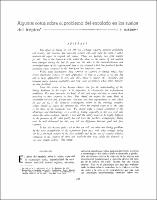Algunas notas sobre el problema del encalado en los suelos del trópico
ISSN
0041-4360Fecha de publicación
07-1968Autor
Martini, J.A.
Tipo
Artículo
Metadatos
Mostrar el registro completo del ítemResumen
The effect of liming on soil pH, ion exchange capacity, nutrient availability and toxicity, soil structure and microbial activity and crop yield has been a rather controversial aspect in tropical soil science. There are, perhaps, two good reasons for this. One is the dynamism with which the ideas on the nature of soil reaction have changed during the last 20 years and the other is the contractiveness and inconclusiveness of the experimental data so far obtained which has produced further confusion when compared to the data form the temperate zone.
While many investigators have reported no response to liming, others have shown significant response to small applications of lime as a source of Ca and Mg and to large applications in very acid soils, where it reduces Al - toxicities, and increases native nutrient availability and crop yield, particularly when other nutrients are also fertilized.
From this review it has become obvious that for the understanding of the liming problems in the tropics it is imperative to characterize our experimental conditions. We must determine the kinds of soils and crops and how to group them according to their response to lime. One should not expect the same kinds of correlation between pH, percent base saturation and lime requirements in soils where Al and not Ca is the dominant exchangeable cation on the exchange complex; neither should we expect the optimum pH values for tropical crops to be the same as for those of the temperate zone. We should make a critical evaluation of the advantages and disadvantages as a result of liming, especially in the very acid soils where the cation exchange capacity is low and the acidity seems to be highly buffered by the presence of Al. And finally but not least, the practices accompanying liming must be well delineated for this, may tell the difference between good and poor response.
It has also become quite evident that we will not solve our liming problems but the mere extrapolation of the experiences from areas with other ecologic setting but by a thorough analysis of the data available and by the use of creative initiative conducive to the creation of rules and standards that may satisfy the demands of our own unique ecology
Palabras clave
Representación
Sede Central
Editor
Instituto Interamericano de Ciencias Agrícolas (IICA)
Es parte de
Turrialba; Vol.18, no. 3
Status
openAccess
URI (Enlace permanente para citar o compartir este ítem)
https://repositorio.catie.ac.cr/handle/11554/13427Colecciones
- Turrialba [2688]


